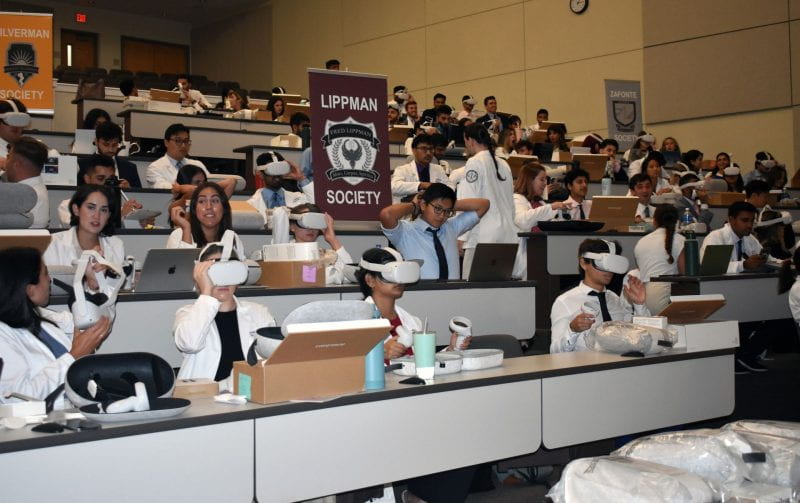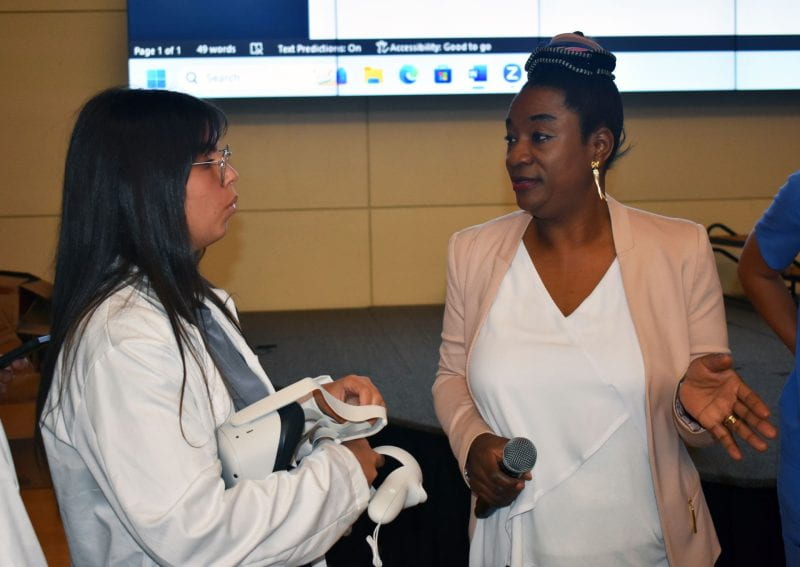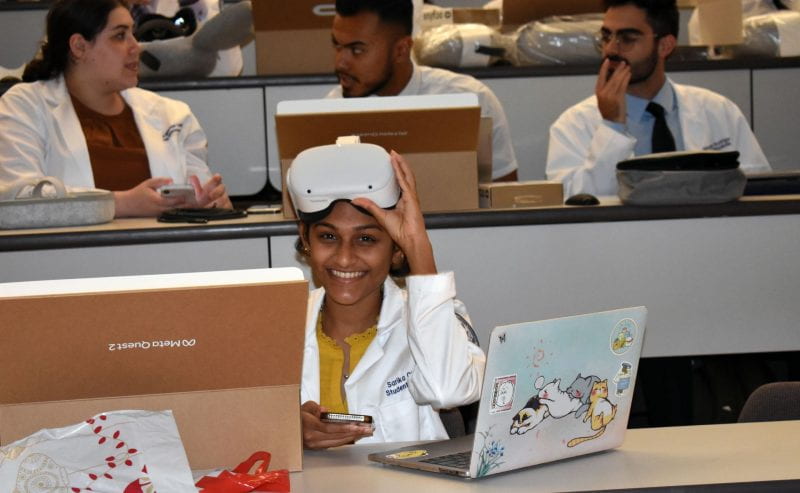Osteopathic Medicine Dives Into Immersive Learning


As the health care profession continues to evolve, immersive virtual learning has become an integral part of the educational experience. In a recent question/answer session, I reached out to Dr. Elizabeth Oviawe, NSU’s Director of Division of Institutional Technology with the Dr. Kiran C. Patel College of Osteopathic Medicine, to get her insight on NSU’s cutting-edge approaches to training the doctors of the future.
How many osteopathic medicine students received the Meta Quest 2 headsets this semester as part of their educational experience?
More than 400 of our first-year students at both our Davie and Tampa Bay campuses received Meta Quest 2 Virtual Reality (VR) headsets.

Dr. Elizabeth Oviawe, right, works with a student.
Will the students be using them throughout their full educational journey?
Our students will be using the Meta Quest 2 VR Headset from their first and second year in their preclinical courses and labs and in their third and fourth year for their immersive virtual rotation experience. So, yes, our students will use this immersive technology throughout their educational journey at Dr. Kiran C. Patel College of Osteopathic Medicine (KPCOM) for greater academic success.
What are a few of the ways that this technology will be essential in the students’ journeys to become doctors?
Using this innovative immersive technology will transform the way our students learn and help reinforce and enhance their understanding and application of complex clinical concepts and procedures in a risk-free environment that engages all their sensory organs fully immersive to build their competency in pertinent skills until mastery in preparation for real life experience.
How does such technology situate NSU in terms of innovations in healthcare?
Immersive learning technology is the way of the future in teaching and learning, notably in healthcare education and delivery. Leveraging Augmented reality (AR), Virtual Reality (VR), Mixed Reality (MR), and Artificial Intelligence (AI) including 3D visualization, hologram and 3D printing model has placed KPCOM ahead of the curve and thus extending our achievement to the greater good of the NSU as a whole. Part of our effort is also dedicated to “medical technology innovation research and development (MedTECH Innovate R&D)”, an arm of KPCOM-DiTECH which serves as incubator in the exploration of advanced medical technology application and development. To strengthen our efforts in this innovative adventure we have partnered with Meta (formerly Facebook) in the area of research and development. Meta is the manufacturer of the VR headsets that our students are using. We are breaking ground at KPCOM in innovative curriculum transformation, and extending the know-how of these Immersive learning technologies skill to other NSU educators and programs is our passion. I am so thankful to my dean, Dr. Elaine Wallace, and Dr. Phyllis Filker for their support and leadership in this endeavor.
 What are some of the other efforts you’re involved in to spread the wealth of immersive technology?
What are some of the other efforts you’re involved in to spread the wealth of immersive technology?
In order to foster this effort, I began a training workshop series titled “Hone your skill in Immersive Learning Experience” to train NSU educators and provide them with the skills to transform their curriculum. A repeat of this first series will happen later this fall. The second series with selected specific programs at NSU who are ready for the next step is currently ongoing. The cumulative efforts of this initiative will place NSU in the frontier of futuristic technology in the immersive learning experience for health care education training advancement. I am very excited to be of service in extending my skill in the cutting-edge immersive learning technology adoption and integration across NSU.
Posted 08/27/23